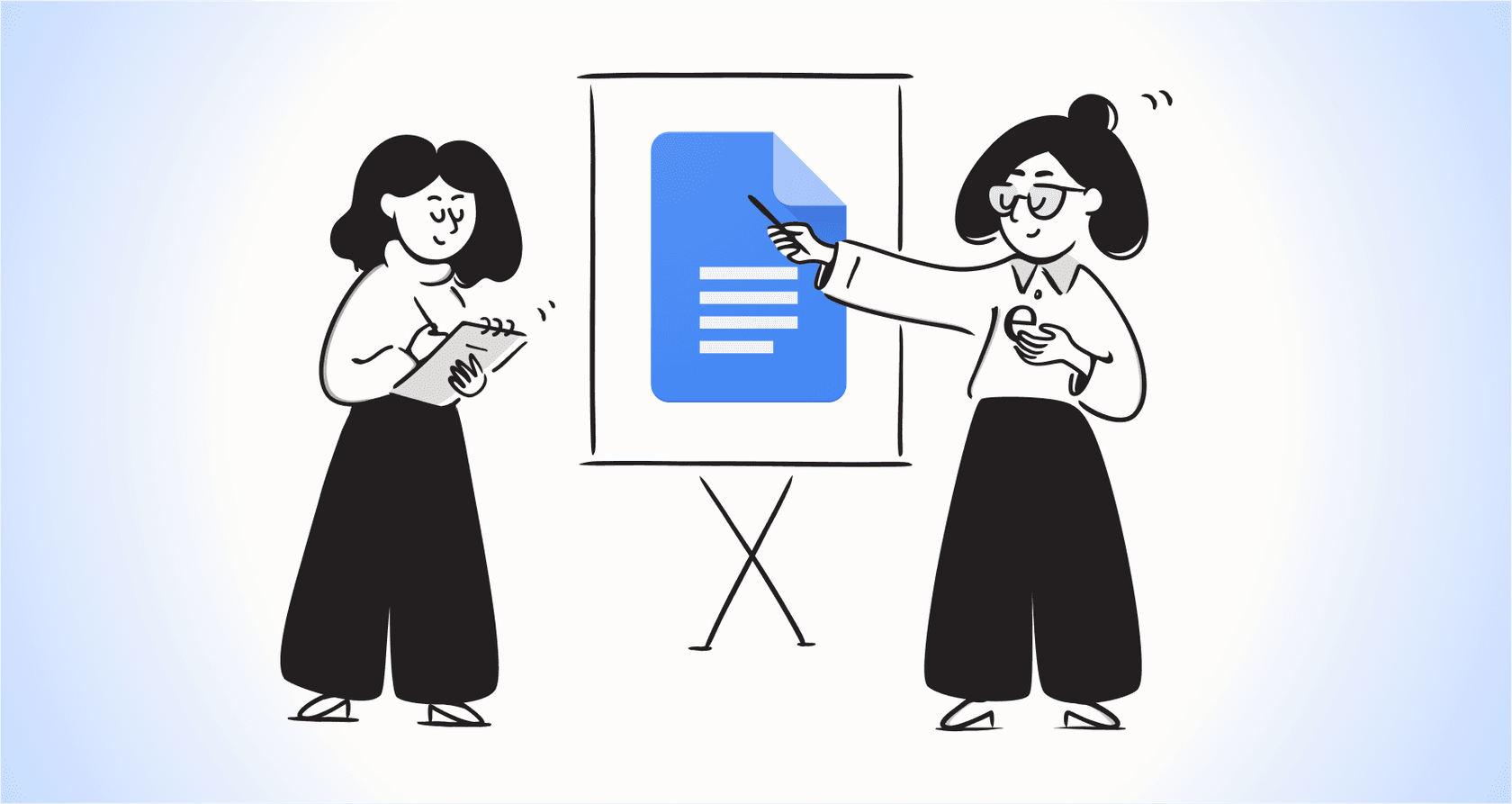What is Google Copilot? A complete guide for 2025

Stevia Putri

Kenneth Pangan
Last edited September 21, 2025
Expert Verified
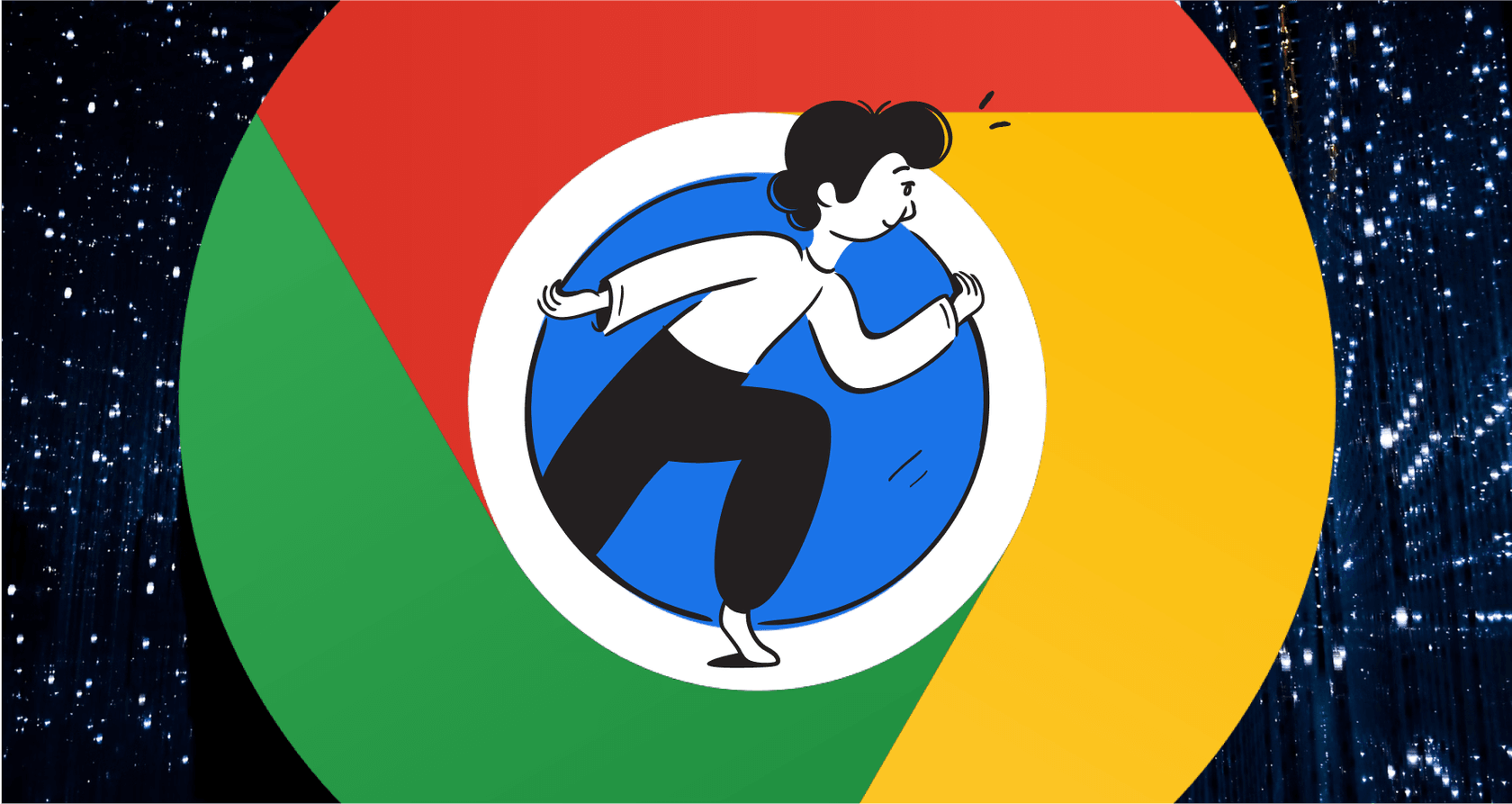
It's a safe bet you landed here after typing "Google Copilot" into a search bar. It’s a perfectly logical thing to search for. Microsoft has its Copilot, so it feels like Google should have its own version with the same name, right?
While there’s no product officially called "Google Copilot," your search hits on a real and growing need: a smart AI assistant that works smoothly inside the Google world. The thing is, the AI productivity space often feels like you have to pick a side: Team Microsoft or Team Google. They’ve both built powerful assistants that work great within their own set of apps. But what happens when your team, like most modern teams, doesn't live in just one of those worlds? What if your knowledge base is in Google Docs, but your support team works out of Zendesk all day? This is where the walls around these ecosystems start to feel pretty high.
This guide will clear up the confusion around your search for a Google Copilot. We'll look at the actual contenders, Microsoft Copilot and Google's AI, Gemini. We’ll explore what they do well, where they miss the mark, and introduce you to a more flexible alternative built to work with all the tools you’re already using.
What is a Google Copilot and why are people looking for it?
When you search for "Google Copilot," you're probably looking for one of three things:
- Google's answer to Microsoft Copilot. This is the most common one. You want to know what Google calls its AI assistant and what it can do. The short answer is Google Gemini (which you might have known as Duet AI).
- A way to get Microsoft Copilot working inside Google apps. Maybe you're a Microsoft 365 user who spends a ton of time in Chrome, Docs, or Sheets and wants to bring your AI assistant along for the ride.
- An AI tool from another company that connects with Google products. You're on the hunt for an AI that can plug into your Google Drive, chat with you in your browser, and help streamline your work, no matter who built it.
Really, it all boils down to wanting to get work done faster. You've got Microsoft Copilot, which is tangled up in everything Windows and Microsoft 365, and you've got Google Gemini, which is quickly becoming a core part of Google Workspace.
The catch? Both tech giants have built their AI assistants to keep you planted firmly in their world. This creates a huge headache for businesses that use a mix of different tools, which is pretty much every modern support and IT team out there.
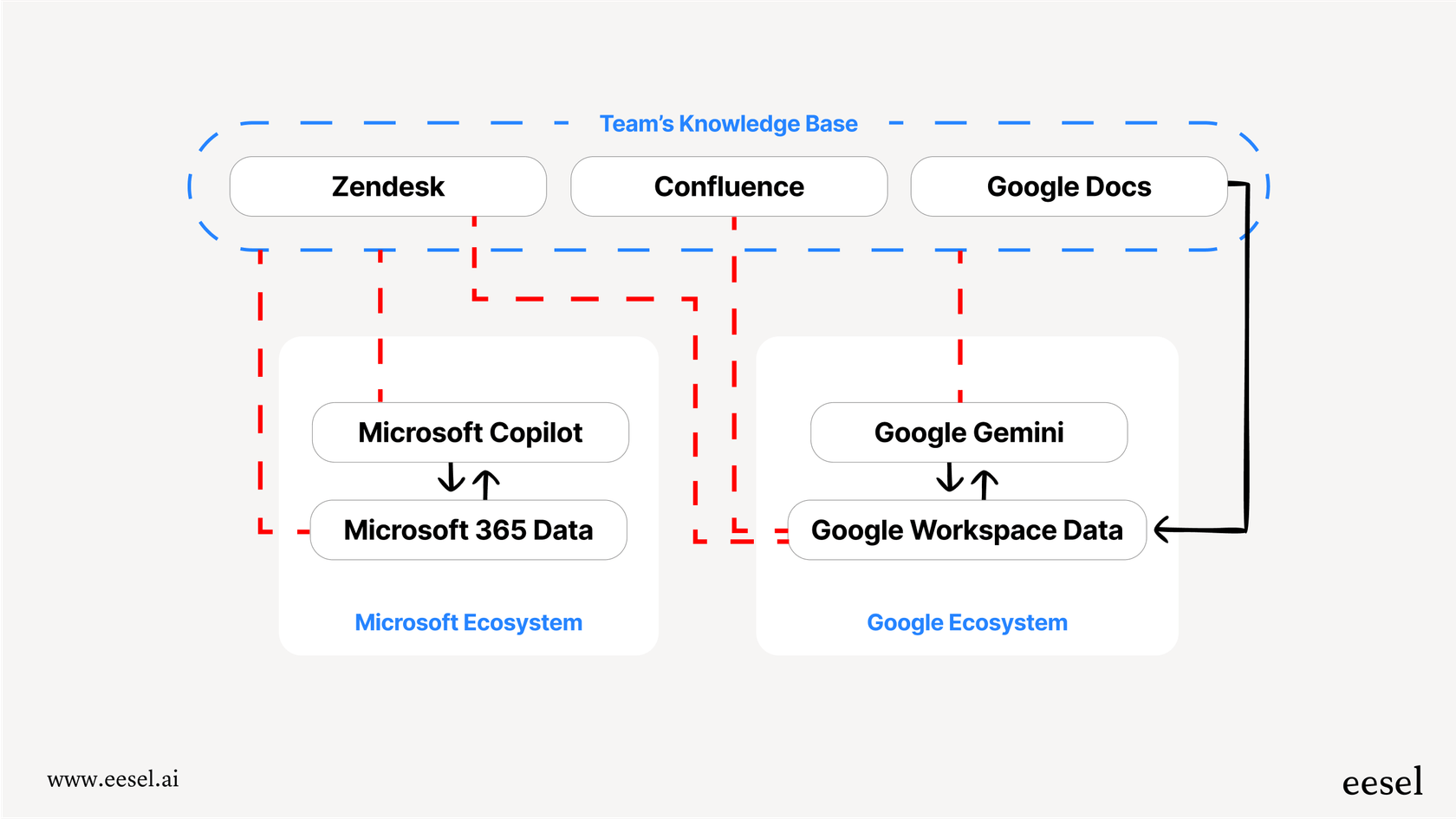
The official Google Copilot contenders: Microsoft Copilot vs. Google Gemini
To figure out what a real Google Copilot should be able to do, let's look at what the two big players actually offer. Both are impressive general tools, but as we'll see, their main strength is also their biggest weakness: they're designed for everybody, which means they aren't specialized for anybody.
Core Google Copilot functionality and integration
Both Microsoft Copilot and Google Gemini are built to give the apps you use every day a boost. Copilot understands your work by looking at your data across the entire Microsoft 365 suite, from emails in Outlook to files in OneDrive and chats in Teams. In the same way, Gemini is baked into Google Workspace, helping you draft in Docs, organize in Sheets, and build presentations in Slides.
This tight integration is great if your company's entire universe is run by a single vendor. But what happens when your company knowledge is split between Confluence and Google Docs, while your customer chats are happening in Zendesk or Intercom? All of a sudden, your smart AI assistant is completely blind to some of your most important information. And that's exactly the gap a tool like eesel AI is built to fill, by connecting all your different apps into one brain.
A Google Copilot feature-by-feature comparison
When you put them side-by-side, you see two very similar assistants that are good at general business stuff.
| Feature | Microsoft Copilot | Google Gemini (in Workspace) | Key Limitation for Support Teams |
|---|---|---|---|
| Document Creation | Works in Word, pulls info from other M365 docs (OneNote, PowerPoint). | "Help Me Write" in Google Docs, uses "smart chips" for changing info. | Doesn't have any context from your helpdesk or past customer tickets. |
| Email Assistance | Drafts emails in Outlook, using context from your M365 data. | "Help Me Write" in Gmail, can adjust tone and summarize threads. | It can't do the real work, like tagging a ticket or looking up order info. |
| Spreadsheet Analysis | Finds trends in Excel, suggests formulas, creates charts. | Creates custom templates in Sheets, helps sort and classify data. | Not built to analyze support metrics or ticket data from a helpdesk. |
| Meeting Support | Summarizes Teams meetings, finds action items, pulls in M365 info. | Generates backgrounds in Meet, takes notes, can even "attend" meetings for you. | Can't link meeting notes directly to a customer's ticket or update a CRM. |
| Pricing Model | $30/user/month on top of a Microsoft 365 subscription. | $30/user/month on top of a Google Workspace subscription. | Can get pricey and locks you into one specific suite of tools. |
The verdict: Which is the better Google Copilot for general productivity?
So, which one wins? Honestly, it depends on which flag you've already planted. If your company runs on Microsoft 365, Copilot is the obvious choice. If you're a Google Workspace shop, Gemini is the way to go.
But this brings us right back to the main problem. Picking one means you lose out on having your AI work with the other half of your tools. For teams in customer support, IT, and operations, this isn't just a small annoyance; it's a real headache that slows everyone down. They need an AI that can bridge these gaps, not make the walls higher.
This detailed review compares the features of Google Gemini and Microsoft Copilot to help you decide which AI assistant is better for your needs.
The Integration Gap: Can a Google Copilot work everywhere?
Tired of being stuck in these walled gardens, a lot of people look to browser extensions and other tools to try and piece together a universal AI assistant.
Google Copilot browser extensions and third-party tools
A quick look at the Chrome Web Store shows dozens of extensions that promise to bring a "Copilot" experience to your browser. These tools usually add a sidebar to your screen, giving you a generic chat window you can use on any website.
They can be useful for asking a quick question or summarizing a webpage, but they don't come close to being a real copilot. Here’s why:
- They don't truly connect: They can't interact with the specific parts of the app you're using. They can't read your Zendesk ticket fields or pull customer info from your internal dashboard.
- They can be a security risk: Giving a third-party extension permission to see everything you do in your browser can be a major privacy concern.
- They're a patch, not a solution: They just stick a generic layer of AI on top of your work, instead of being a part of it.
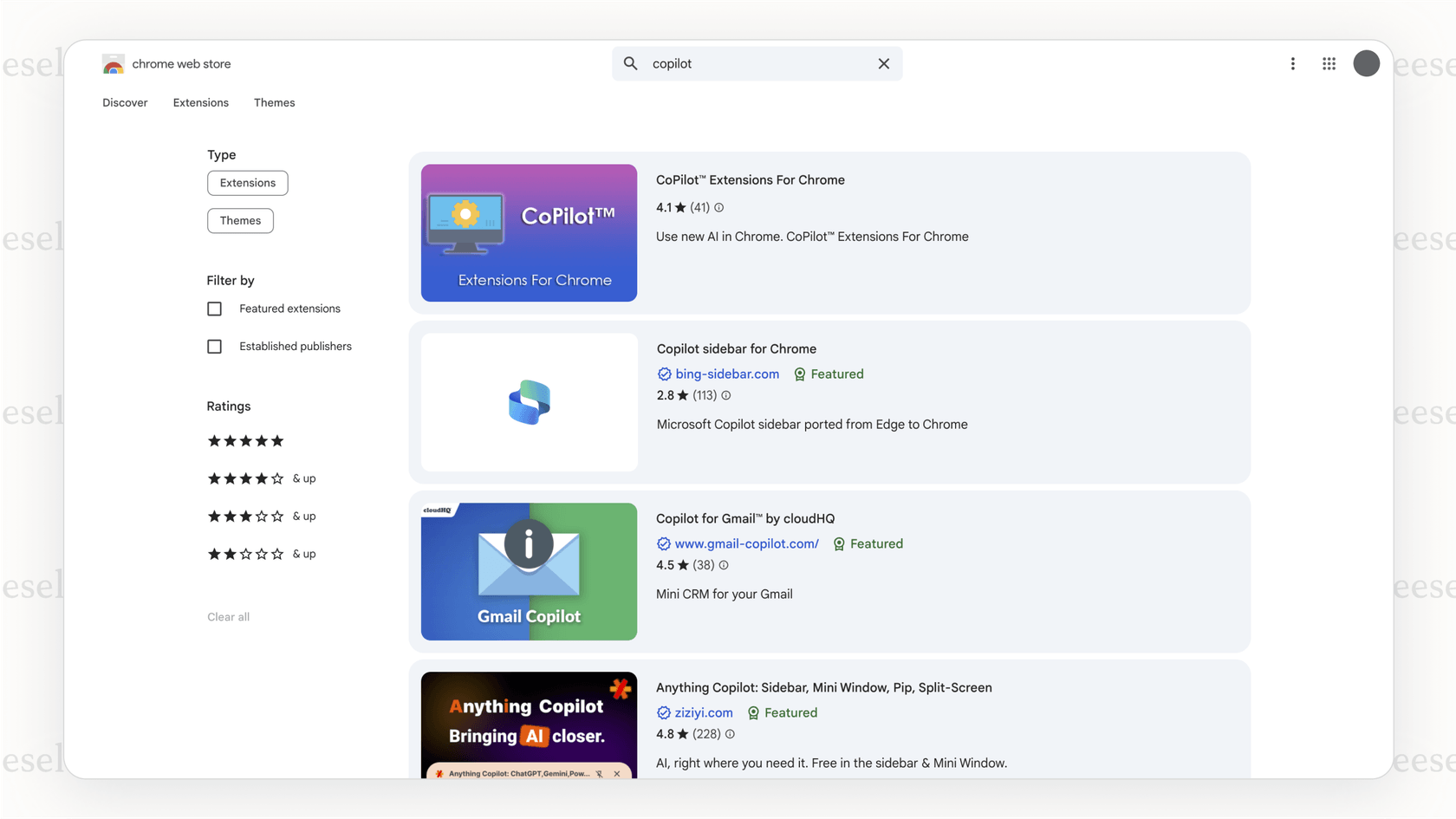
These extensions are a sign of the problem, not the fix. They show just how much people need an AI that can work natively inside and across their most important apps.
The problem with a one-size-fits-all Google Copilot approach
The real issue with general AI assistants like Copilot and Gemini is that they try to be a jack-of-all-trades, which makes them a master of none. They're designed to do a little bit of everything for everyone, so they fall flat when it comes to specialized jobs like customer support or IT service management.
They can help you write an email, but they can't do the important support tasks like:
- Triaging and sending a ticket to the right person.
- Applying the correct tags based on what the ticket is about.
- Looking up a customer's order status in your Shopify store.
- Escalating a tricky issue to a human agent with all the necessary background info.
And most importantly, they can't be trained on your most valuable knowledge source: the thousands of past support conversations that hold your brand's unique voice, common issues, and proven solutions. This is where an AI built specifically for the job really pulls ahead.
A better alternative: A specialized AI agent for your support workflow
Instead of trying to cram a generic AI into a role it wasn't designed for, a better idea is to use a tool built from the ground up to handle your specific tasks. This is where eesel AI comes in, offering a solution to the very problems that lead people to search for a Google Copilot.
Unify your knowledge wherever it lives
You don't have to be locked into a single ecosystem. eesel AI is made to connect to all your knowledge sources, creating one unified brain for your AI assistant. You can easily pull in information from:
- Company Wikis: Confluence, Google Docs, Notion, SharePoint, and more.
- Helpdesks: Instantly connect to Zendesk, Freshdesk, Intercom, Gorgias, and Jira Service Management.
- Past Conversations: Here's what really sets it apart. eesel AI trains on your historical tickets to learn your specific tone, context, and solutions. This means its responses are on-brand and accurate from day one. A generic AI just can't do that.
Instead of being stuck in one system, eesel AI connects to the tools you already have, turning scattered information into a single source of truth for your AI agent.
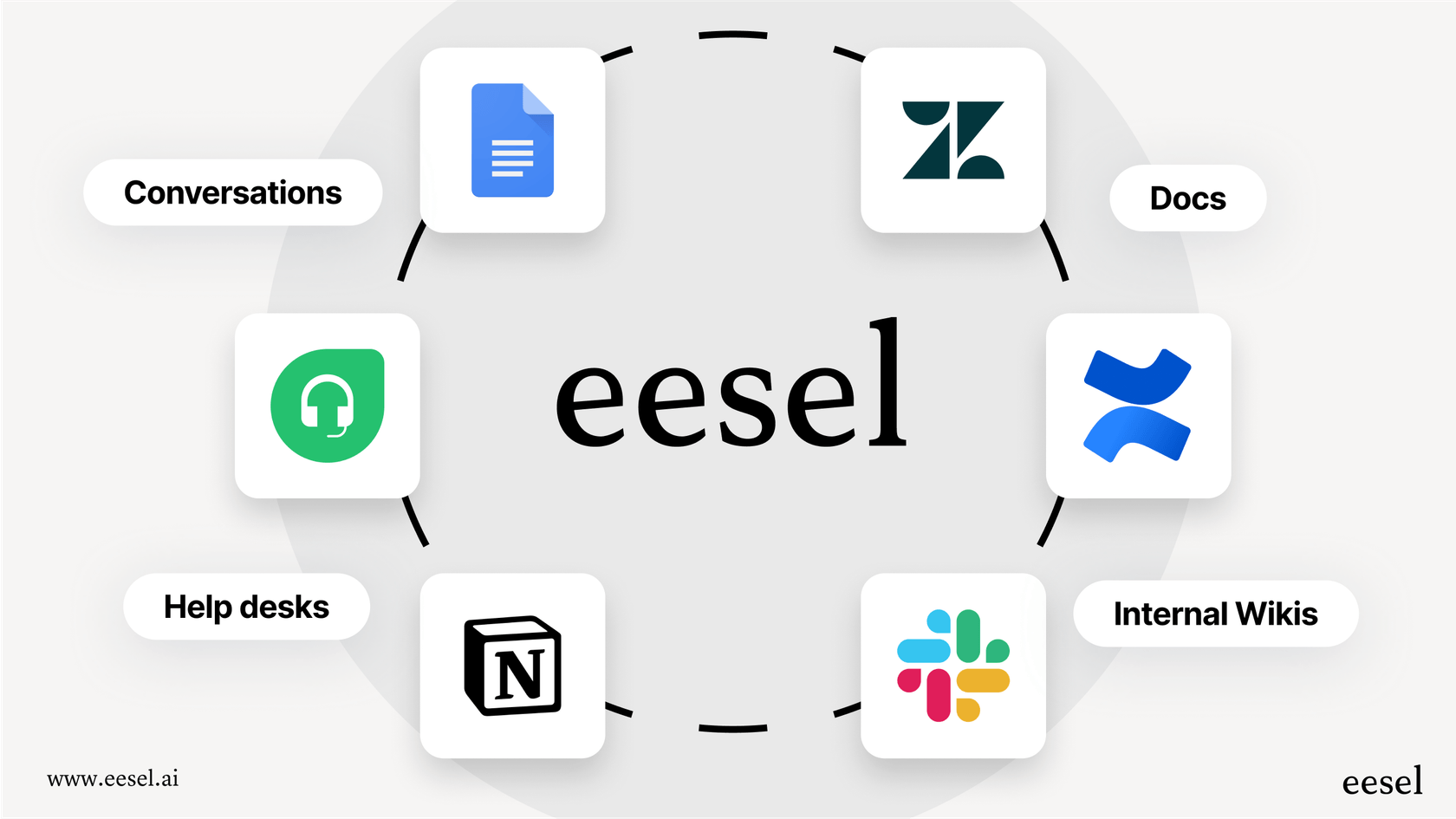
Go live in minutes: A truly self-serve platform
Getting started with powerful AI often means sitting through endless sales calls, mandatory demos, and long setup projects. eesel AI is different. It’s a refreshingly simple, self-serve platform. You can sign up for free, connect your helpdesk with a click, and launch a basic AI agent in minutes, not months.
Best of all, you can try everything out with zero risk. eesel AI's simulation mode lets you test your AI setup on thousands of your past tickets in a safe environment. You can see exactly how it would have replied, get solid forecasts on your automation rate, and tweak its performance before it ever talks to a single customer.
Take control with a customizable Google Copilot workflow engine
Good support automation is about more than just answering questions. It's about taking action. With eesel AI, you get a fully customizable workflow engine, not just a chatbot. Using AI Actions, you can empower your agent to:
- Triage tickets: Automatically route, tag, and prioritize new requests.
- Update ticket fields: Change the status, assignee, or any other custom field in your helpdesk.
- Escalate intelligently: Hand off conversations to the right person with a full summary of what happened.
- Make API calls: Connect to other systems to do things in real-time, like checking an order status in Shopify or pulling account details from your own database.
With eesel AI, you're not just getting an AI chatbot; you're getting a customizable engine that plugs directly into your support operations.
Stop looking for a Google Copilot, build a true AI agent
So, that search for a "Google Copilot"? It points to something bigger: a real need for smart, connected AI that works where you do. While Microsoft and Google have built impressive all-purpose tools, their walled-off, one-size-fits-all design just isn't cut out for the specific, action-focused needs of modern support and IT teams.
A specialized tool like eesel AI offers a better way. It breaks down the walls between your apps, learns from your unique company knowledge, and gives you a customizable engine to automate actual work. It’s the intelligent, connected assistant you were really looking for all along.
Ready to see what an AI support agent built for the job can do for you? Sign up for a free eesel AI trial and connect your knowledge sources in minutes.
Frequently asked questions
No, there isn't an official product named "Google Copilot." People usually use this term when looking for Google's equivalent to Microsoft Copilot, which is called Google Gemini.
For teams deeply integrated into Google Workspace, the official AI assistant is Google Gemini. It's built directly into apps like Docs, Sheets, and Gmail to help with tasks like writing and data analysis.
The main drawback is that it's a "walled garden." Gemini has deep knowledge of your Google Workspace data but is completely blind to information in third-party apps like Zendesk or Confluence, which limits its usefulness for support tasks.
While some browser extensions offer a generic AI chat sidebar, they aren't a true solution. They can't interact with the specific data inside your apps (like a support ticket) and can pose potential security risks.
Unlike a general-purpose AI, a specialized tool like eesel AI connects to all your knowledge sources, including your helpdesk and wiki. It can also be trained on your past support tickets and take actions like triaging or tagging, which general AI assistants can't do.
Share this post

Article by
Stevia Putri
Stevia Putri is a marketing generalist at eesel AI, where she helps turn powerful AI tools into stories that resonate. She’s driven by curiosity, clarity, and the human side of technology.

